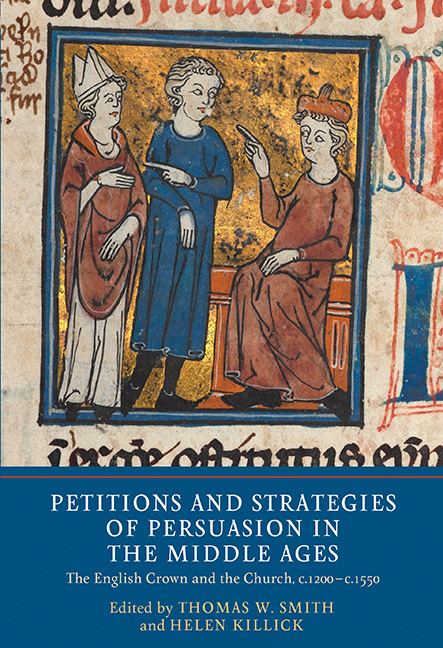 Petitions and Strategies of Persuasion in the Middle Ages
Petitions and Strategies of Persuasion in the Middle Ages Book contents
- Frontmatter
- Dedication
- Contents
- Contributors
- Foreword
- Acknowledgements
- List of Abbreviations
- Introduction: Medieval Petitions and Strategies of Persuasion
- 1 Blood, Brains and Bay-Windows: The Use of English in Fifteenth- Century Parliamentary Petitions
- 2 Petitioners for Royal Pardon in Fourteenth-Century England
- 3 The Scribes of Petitions in Late Medieval England
- 4 Patterns of Supplication and Litigation Strategies: Petitioning the Crown in the Fourteenth Century
- 5 Petitions of Conflict: The Bishop of Durham and Forfeitures of War, 1317–1333
- 6 A Tale of Two Abbots: Petitions for the Recovery of Churches in England by the Abbots of Jedburgh and Arbroath in 1328
- 7 ‘By Force and Arms’: Lay Invasion, the Writ de vi laica amovenda and Tensions of State and Church in the Thirteenth and Fourteenth Centuries
- 8 The Papacy, Petitioners and Benefices in Thirteenth-Century England
- 9 Playing the System: Marriage Litigation in the Fourteenth Century
- 10 Killer Clergy: How did Clerics Justify Homicide in Petitions to the Apostolic Penitentiary in the Late Middle Ages?
- Index
Foreword
Published online by Cambridge University Press: 20 August 2020
- Frontmatter
- Dedication
- Contents
- Contributors
- Foreword
- Acknowledgements
- List of Abbreviations
- Introduction: Medieval Petitions and Strategies of Persuasion
- 1 Blood, Brains and Bay-Windows: The Use of English in Fifteenth- Century Parliamentary Petitions
- 2 Petitioners for Royal Pardon in Fourteenth-Century England
- 3 The Scribes of Petitions in Late Medieval England
- 4 Patterns of Supplication and Litigation Strategies: Petitioning the Crown in the Fourteenth Century
- 5 Petitions of Conflict: The Bishop of Durham and Forfeitures of War, 1317–1333
- 6 A Tale of Two Abbots: Petitions for the Recovery of Churches in England by the Abbots of Jedburgh and Arbroath in 1328
- 7 ‘By Force and Arms’: Lay Invasion, the Writ de vi laica amovenda and Tensions of State and Church in the Thirteenth and Fourteenth Centuries
- 8 The Papacy, Petitioners and Benefices in Thirteenth-Century England
- 9 Playing the System: Marriage Litigation in the Fourteenth Century
- 10 Killer Clergy: How did Clerics Justify Homicide in Petitions to the Apostolic Penitentiary in the Late Middle Ages?
- Index
Summary
This collection of essays on petitioning in secular and ecclesiastical courts during the later Middle Ages bears testimony not only to the exceptionally rich body of archival evidence that survives for such processes but also to the intense interest that researchers have given to that material over the last decade and more. Very importantly, it seeks to address the place of petitioning within wider legal strategies and thus to pinpoint the role of ‘professionals’ in formulating and presenting the substance and context of the grievance of the plaintiff. In an earlier stage of thinking about this topic we may have been inclined to be misled by the apparent authenticity of the plaintiff's voice: not just because of the comparatively discursive nature of petitionary form but also because petitions were often made in the name of people who were comparatively marginalised by the usual formalities of legal process (peasants and women being notable cases in point) and whose predicaments sometimes make for very vivid narratives. To understand the ways in which experts at various levels imagined and composed the plaints of their clients such as to address the relevant points of law and/or to articulate the need for a resort to grace is not necessarily to call into doubt the more sensational aspects of some petitions. It does, however, serve as a salutary warning that the motives and aims of plaintiffs and their advisers were focused, purposeful and constructive. The hopeless conditions in which so many petitioners declared themselves were therefore part of a deliberate strategy of redemption and in this sense reflect not simply on the (undoubted) nastiness of the times but also on the remarkable confidence that later medieval society showed in the formal systems available to provide right for blatant wrongs.
A further feature of the studies represented in this volume is the way that such legal strategies crossed boundaries: those between Church and State, as well as those between princely jurisdictions. While the great majority of the case studies address material held in English archives, the process of petitioning needs to be thought of as a much more general European phenomenon, and one that was international in its potential reach. Studies of petitions to the papacy remind us that all parts of Latin Christendom needed to develop structures and communication systems that allowed private parties to access the grace of the curia.
- Type
- Chapter
- Information
- Petitions and Strategies of Persuasion in the Middle AgesThe English Crown and the Church, c.1200–c.1550, pp. x - xiPublisher: Boydell & BrewerPrint publication year: 2018


